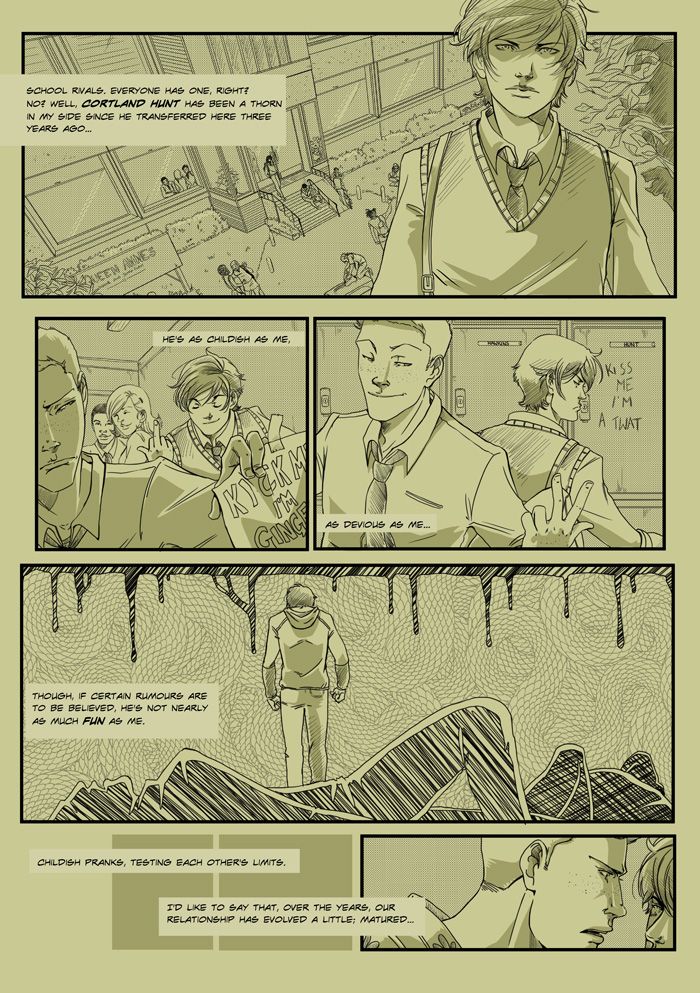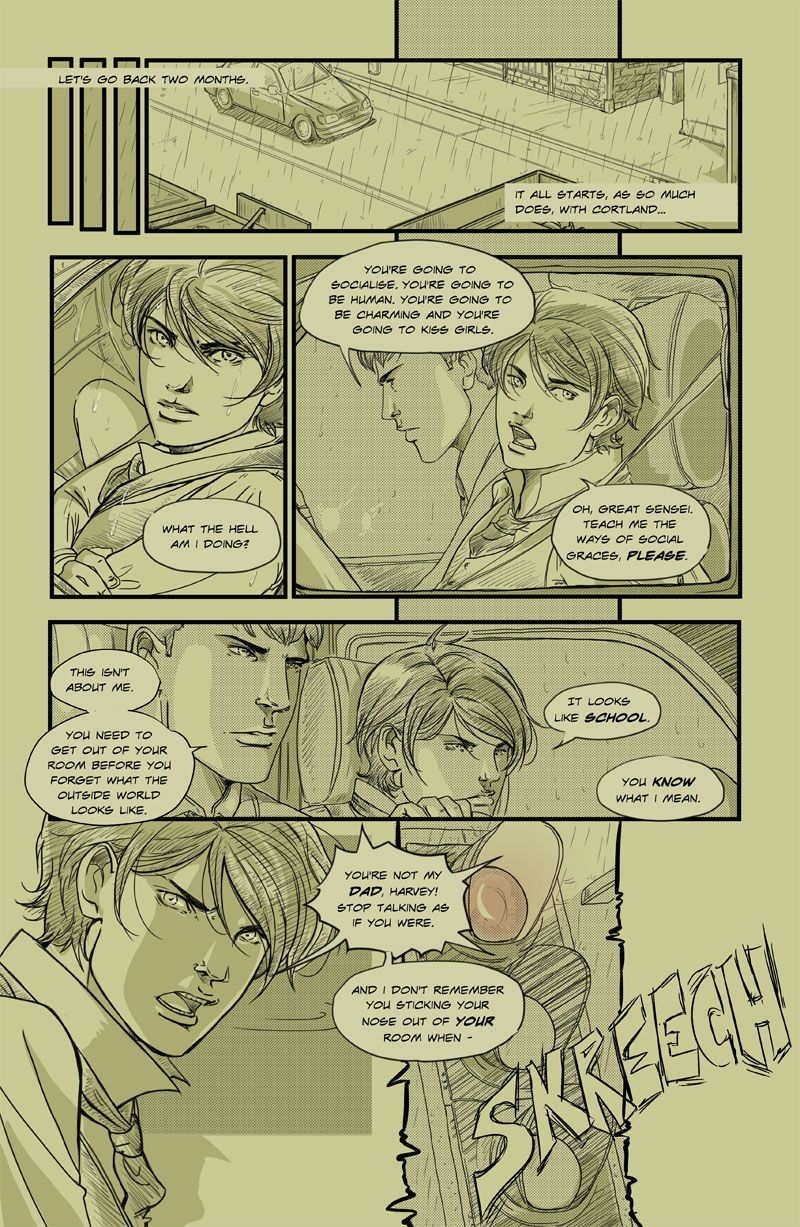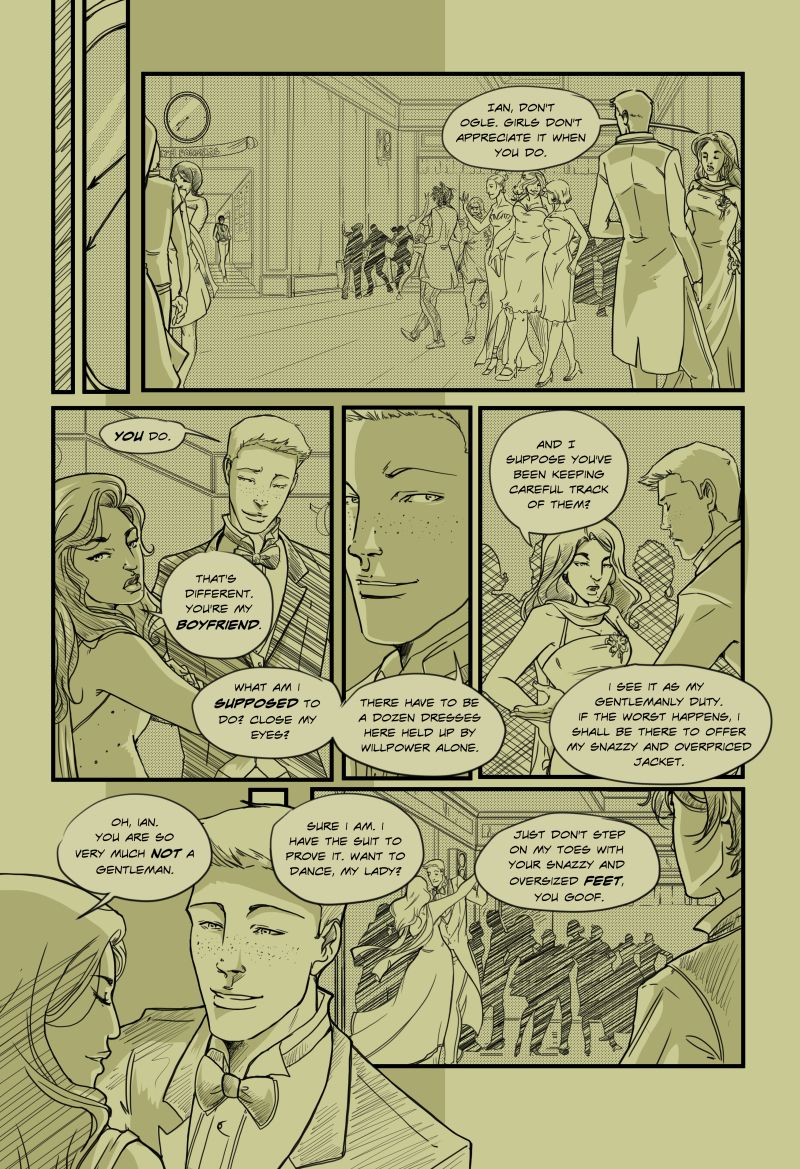The Internet has proved a fantastic place for comic creators to take their creator-owned projects, free of editorial interference and free to go in any direction they want. The latest creator-owned project to gain buzz from readers and critics alike is "BREAKS" by novelist Malin Ryden and writer/artist Emma Vieceli. A gay romance story with several surprising twists and turns, "BREAKS" is a chance of pace for Ryden, who is most well-known for her horror novels and a turning point for Vieceli, following her runs on "Vampire Academy," "Young Avengers" and "The Avalon Chronicles."
CBR News spoke to Ryden and Vieceli about developing and launching "BREAKS," how the origins of the project lie in fanfiction for BioWare's "Dragon Age" video game franchise, plans to ultimately take the story to print. Plus, the duo details their love of sepia tones and the differences between digital and print.
CBR News: Emma, Malin -- what is the basic premise of "BREAKS"?
Emma Vieceli: The tag line we've been using is "It's a love story...but a bit broken," which sort of sums it up. [Laughs] "BREAKS" is a character piece; there's a lot going on, but the unexpected support that our main characters Cortland and Ian find in each other is the driving force of it all.
Alongside that connection, we're dealing with characters on the brink of becoming adults, and what that means for each of them in their respective situations. Where some characters have ambitions and dreams ahead of them, others are already trapped by their past mistakes in a system that makes them feel hopeless at times.
Malin Ryden: As Emma said, it is at heart a character piece and a love story. That being said, it is also about growing up and what society, friends and family expect of you compared to what you want for yourself. Some lines of conflict will be obvious from the start, others will be revealed as the story progresses. There might be quite a few curve balls there.
You've made a few pages available already for people to read online at the site. And interestingly, you've decided to use sepia tones for your page. Why choose that rather than the expected white? Do you think it adds a sense of unease?
Vieceli: [Laughs] I love sepia! But, more importantly, a large theme of our story is about moving away from thinking in black and white, so printing in black and white would have felt wrong. Also, I wanted to elevate the pages visually. Because we're sharing the story online before going to print, we want it to be eye-catching and visually recognizable.
I just don't have the time to put into making full color pages for the web edition, sadly. Lastly, there's something about the tone that adds the gravitas of time, I feel. Is that wanky? Probably. But yeah, this is very much a story being told. Despite its grounding in modern day, its themes are timeless and applicable to any age, any place. So, sepia.
Ryden: We have indeed bonded over our love of sepia. It might have started because I am so fond of Emma's sketches. Seriously, she is a wizard on paper. However, we quickly found out that cleaning up old-fashioned pencil drawings for publishing took as long as doing proper inks and colors, and since there are no hidden millionaires funding this project, we cannot take forever. This was what Emma came up with, and I really think it looks gorgeous.
Emma, your art for these pages uses the gutters in interesting ways. How do you approach the designs and layouts of "BREAKS" for the online edition?
Vieceli: I'm having to think with a print head on still, for the most part. Eventually, this will be a book, so I can't get too crazy online. Though I'm actually toying with the idea of some animated sections of pages -- I don't know. Depends how much time I can put into this. I'd say there's nothing hugely radical about the layouts at this stage - the paneling is pure cinematic editing, moving the story along, offering pacing and scene fade-ins and fade-outs.
If something takes place outside of a panel border, it usually means it's a non-diegetic element, an internal moment, or something that really demands that the reader place importance on it. Hopefully, none of that will need to be a conscious decision from the reader's point of view, obviously! It would be a very tedious read if it was. [Laughs]
Malin, you're known most notably as a horror writer. Was this a change of pace for you? What appealed to you about this project?
Ryden: It was quite a huge change of pace actually. I've been a long time reader and lover of comics since my grandmother bought me some "Legion of Super Heroes" (Rymdens Hjältar in Swedish) back when I was six years old, but this is my first attempt at writing them. An issue is a bit like writing a short story: you need to tell an entire tale in little over twenty pages.
The trick for me is to cut down on my words and trust Emma to convey what the characters are thinking with pictures instead of prose. It feels a bit like I've chopped off one of my arms and in return got a nice and shiny cyborg limb. It might feel a bit awkward at the start, but oh so shiny!
What appealed to me with it was honestly to be able to work with Emma. We've had a few other ideas as well, including an almost finished horror novel, but in the end this project has kept popping back up to the surface. It's just a story I love, and one that is so very close to my heart.
How did you meet each other? Were you already fans of one another's work?
Vieceli: We have a great origin story!
I am a massive fan of BioWare's "Dragon Age" games to the point that, a couple of years ago, I actually started penning a fanfic set in the world. It was the first time I'd done something like that, but I was missing prose writing (I used to write before I drew, way back when) and I was inspired by the incredible talent and enthusiasm of the fandom around the games.
I was reading a lot of great fiction, and one of the titles I was most enjoying was Malin's. Not that I knew her name then. Or anything about her, for that matter. I just loved her writing. At some point a writing group was started, spinning off from the fandom-friends made through tumblr. It was a small band of creative writers who decided we should each take our own character and throw them into a school setting and just see what happened.
It was technically called an "RP," (Role Play) but this was a pretty new and crazy sounding notion to me, so when I was invited on, I was pretty hesitant at first. I'd never done anything like that and I didn't quite get how it worked.
There I was with this Cortland character, being a wuss and writing my own solo pieces because I didn't understand how to separate "writing" and "RP." Pretty soon, I had a story building in my head and I liked it. The atmosphere of the group was really conducive to creativity! What I hadn't planned on was Ian, Malin's character.
Bare in mind that, at this point, Malin and I still didn't know each other, had no direct contact. She didn't know I was a professional comicker and I didn't know she was a published horror writer. We could only communicate via the prose of the story that was building. Well, Ian pretty much barged into Cortland's life and turned it upside down and suddenly this amazing, magical thing happened. Malin's story about Ian and my story about Cortland started to fuse and took both characters in directions neither of us had expected!
About a year after the group had been formed, we realized that, actually, we had something pretty cool on our hands and that we should probably bite the bullet, reveal our true identities, and talk about planning this story properly.
Ryden: As Emma said, "Dragon Age" is to blame. At the time "DA2" was released, I felt I had pretty much found my style when it came to writing horror. However, there are about as many Swedes as there are people in New York, so I wanted to get started writing professionally in English as well. I also felt that I needed to work on dialog and action, two things that are a bit rarer in horror.
Fan-fiction felt like the best way to try out my new style anonymously, and at the same time get an audience I could experiment on. What did people like? What didn't they like? What I had not expected was how much I would come to love the community and the people involved. I had done a bit of RP in the past and was no stranger to what it was about, so when some people decided to have a bit of fun, I dragged Emma along. I had no idea who she was, but I enjoyed her writing style, and the way she pretty much broke every single rule on how you are supposed to do these RP things.
I liked that, so I kinda crashed her whole single solo story thing. In the end we started writing together, turning separate ideas into single a book, which mutated further into this.
When did you decide to turn your story into "BREAKS"? What inspired you to go the comic route?
Vieceli: I guess it was when we realized that these boys had taken hold in a major way. The story had gone from being a fun bit of hobby writing to something so encompassing it was hard to turn it off. Maybe because both of us were professionals outside of the writing group, we both had that same nagging feeling that creativity was being spent here -- with no visible outcome, except a lot of fun, of course.
We almost resisted doing anything with the story in comic form for a while, partly because I just couldn't see it working with my schedule. The story was so huge, I wasn't sure how to start. But recently, while waiting on the next stage for "Alex Rider" [the graphic novel adaptation], I had some time. Ian and Cortland sort of leapt up and demanded to be drawn.
Huge props to Elle Fara, who was one of the members of the creative writing gang, who has taken on the role of editor and whip-cracker and is ferociously good at it!
Ryden: This project has been bubbling under the surface for a while, and the timing worked just right for us both. I had just finished sending off a book, and there was an opening in Emma's schedule and suddenly there were sketches, and I got started writing scripts and then things just got rolling.
What's your collaborative process? How do you interact with one another when building the story?
Ryden: It has been fantastically fun. At least Emma tells me that my scripts are fun to draw, so I will trust her not to lie there. For me a lot of the work has been cutting and pruning. A prose novel has an entirely different structure than a comic. A lot of the things that we wrote will never make it in the comic at all, and I have needed to write a lot of new connecting scenes.
It has been really interesting thinking in panels and how the pages interact with each other, and since we can pretty much send things back and forth it's been easy and fun. I'm a big fan of collaborative work, and I have to say that Emma has been a dream come true there.
Vieceli: We actually have a fantastic system that feels more collaborative than anything I've worked on before. Firstly, it helps that we have the Cortland and Ian bible: the 70,000 odd word novel that tells the story in prose form. That was entirely co-written, pretty much switching between us scene by scene. One of us would write a section, then mail it along for the other to add to. Sometimes the other person would add a twist that person A hadn't planned on, and so the story would swerve and veer again.
It literally grew between us and it was scary how well some elements just slotted in. Malin is taking that prose story and is breaking it down into comic issues, adding some new scenes and exchanges and really making the pacing fit the comic format. It's so fun reading her scripts and seeing what she's done with the story and any new places she's taken it. Then, as I draw out the pages, I do an edit as well, adding elements and ideas, and changing lines here and there. And then, the pages done, we both peruse and tweak a bit more. It's been a very fluid process, and hugely collaborative.
You're known best as an artist, Emma, on comics like "Young Avengers", "The Avalon Chronicles", and "Vampire Academy". But how has it been to get back into writing comics as well as penciling?
Vieceli: I've desperately missed working on my own comics. "Dragon Heir" feels so long ago already, and "Violet" even further back than that. I came into comics through independent press and Sweatdrop, but that can feel a long way away sometimes. Working on "BREAKS" has given me this crazy burst of energy that I didn't know I had in me! It's not that I don't love the series I'm lucky enough to work on, I do!
But making your own comic, your own baby, man -- it's an amazing feeling. There's nothing like it and I'm feeling the same jitters and butterflies that I did when I printed my first ever single issue comic with Sweatdrop back in 2001. And I'm so lucky to be diving back in with someone like Malin. She's that rare, brilliant thing: a brand new voice in comics, but one with a wealth of experience in published prose and a huge love of comics and film. She's professional, driven, but also understands visual storytelling.
She's also got that great excitement that comes with making your first comic, and that in turn inspires me more.
What made you decide to release "BREAKS" digitally before moving to print?
Vieceli: I've found myself following a few amazing webcomics online recently. It's a format that's definitely not limited to gag strips and diary comics any more (though those things are still awesome). Creators are able to use the medium to tell long-form and engrossing stories. And it's a format that offers a unique two-way dialogue between creators and readers.
"BREAKS" is such a real story and it touches on some pretty dark themes, we wanted it to be something readers could interact with if they chose to. That same interaction can build a community and give feedback in a way that printed comics just don't stand a chance to. Rather than constantly paying to print single issues and then expecting people to pay out for a compilation as well, we figured that it would be more sensible to release the story online and then print the collected edition, with (hopefully) a reader-base already keen to buy it by then.
I've been saying for a while now that comics need to go this way, so I figured I'd put my pen where my mouth is!
Ryden: I'm a lonely, lonely prose author, and I love the interactivity of webcomics. As Emma said, I feel that the comic medium is slowly changing, and since people can pretty much download things online if they want to anyway (and have no conscience), why not give them the opportunity to actually fall in love with something legitimately before buying it? Especially without a company as a backer, print can be a huge investment, and if you already have a fanbase online who might be interested in buying, things gets easier.
Now that you've had an experience of publishing a webcomic, Malin, do you have an interest in writing more comics work in future?
Ryden: Of course! I love comics. One reason why I write books is that I can't draw, nor have any real contacts in the comics field, well, at least until I met Emma! I'm also not rich enough to pay an artist for their work, and I know how much time it actually takes to make an issue, let alone an album. I'm a huge comics fan, but I am aware of how tough the industry is.
Wrapping up, Emma, the "Vampire Academy" film recently debuted -- was it strange to see the characters you worked on make the transition to the big screen?
Vieceli: It's been incredible! Getting to go on set and see Gabriel Byrne speaking lines I'd drawn; seeing Zoey Deutch, Lucy Fry and Danila Koslovsky literally being Rose, Lissa and Dimitri! It was just amazing. A surreal and wonderful experience, and I can only imagine how incredible it's been for Richelle [Mead], when she wrote the characters in the first place! Maybe one day we'll see Cortland and Ian on screen? Wouldn't that be a thing!
Viceli & Ryden's "BREAKS" is available online at breakscomic.com.




